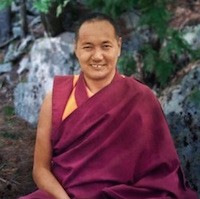
We Westerners always have to blame something external when things go wrong. “I’m not happy; I’d better change this.” We’re always trying to change the world around us instead of recognizing that it’s our own, internal attachment that we have to change.
For example, when you get hurt because somebody calls you greedy, you blame that person for how you feel. Actually, feeling hurt comes from your own attachment. People don’t like your attachment-driven behavior so they call you greedy, hurting your ego. Then, instead of accepting their pointing out your selfish behavior, your attachment to always being right, to being perfect, causes you angrily to reject what they say.
The fact that your ego, your wrong-conception mind, cannot accept criticism is itself a big problem. Your ego wants you to be right all the time and your attachment creates its own philosophy of life: “I don’t need anybody’s advice, especially that of my parents. ” Thus your mind is closed. Then as soon as your parents start to talk, without even listening to what they have to say, you immediately reject it. You don’t even let them finish speaking. As soon as they begin, your ego starts to hurt. This happens because your ego and attachment have already decided to close that door; as soon as your parents try to open it, conflict begins. That’s so silly. How can you say ahead of time that whatever your parents or other people have to say is wrong? But your overestimating ego and attachment make you reject their thoughts completely.
If you realize the shortcomings of attachment, no matter who complains about your behavior, you’ll listen to what they have to say and won’t start arguing the moment they open their mouth. You’ll think about their criticism for a week or a month, checking to see if it’s valid or not. If, after contemplating in this way, you still think they’re wrong, you can go back to them in a very natural, relaxed way, sit down over a cup of tea and talk it over.

You shouldn’t act the same day somebody criticizes you—you’re too nervous, your ego is too involved, and all your old, ingrained thought patterns are too close to the surface. Therefore don’t react immediately. Calm down, think it over and then respond. That sort of approach is much more constructive.
It’s the same when a couple has problems. Instead of immediately starting to argue with your partner, make space. You don’t necessarily have to change the substance of your conversation, just the atmosphere. Don’t react excitedly. Make space for your point of view to grow in the other person’s mind. It’s important to know this psychological approach.
Attachment makes you think, “He’s my father; I’m his child”; “She’s my wife; I’m her husband.” The moment you start to think like that, you’re asking for trouble. Attachment always creates conflict and makes things difficult. Instead of thinking, “I want to help others,” you grasp with expectation, “He’s my father, therefore he should look after me.” All you want to do from the very start is to take advantage of others. As long as your motivation comes from attachment you’ll have difficulty communicating.
It’s a bit surprising, isn’t it? Here at this course you and I are communicating well with each other. Why? You don’t know anything about me. You’ve come to this course, you’re sitting there listening to me, but still we communicate. On the other hand, you’ve known your parents all your life, you’ve lived with your husband or wife for many years, but your communication is not so good. Why is that? Check up right now. Isn’t that silly? It’s also simple. You don’t even know what I am, so how come we communicate with each other? Don’t think it’s the power of the lama, the power of Lord Buddha’s teaching. It’s the power of your own mental attitude. Since fundamentally, your mind has space, communication is natural. If you didn’t have that fundamental space, no matter what I said, it would just go over your head.
~
Read more from Lama Yeshe’s Ego, Attachment and Liberation. This book contains the teachings and meditations Lama gave at a five-day retreat that he led near Melbourne, Australia, in March 1975.
Freely available from Lama Yeshe Wisdom Archive.
~
Author: Lama Yeshe
Editor: Travis May
Images: Lama Yeshe Archive: Image1, Image 2






Read 0 comments and reply